![[Metroactive Features]](/gifs/feat468.gif)
[ 'Best of' Index | Santa Cruz | Metroactive Home | Archives ]
In this issue honoring the best this area has to offer, Metro Santa Cruz salutes a few of the heroes in our community who give peace a chance in their own -- sometimes unusual --ways, by working for positive social change every day
By Rebecca Patt
Amid all this warmongering and pressure to suspend dissent for the duration of the very war one might want to express dissent over, it can be easy to feel isolated and overwhelmed, as if thug dictators, oil executives, arms manufacturers and moronic white men with virility problems were controlling everything, and you, going about your daily life and trying to avoid getting hit by an SUV, are somehow irrelevant.
But the truth is we can do something that matters. Everyday, people from all walks of life in our community are working their asses off to find ingenious ways to make a difference. Metro Santa Cruz looked around and found six individuals dedicating their lives to forging smart freedom and bold compassion at many different levels. They are taking dynamic action to transform the world through peace, healing, justice and understanding.
And these are just a few among thousands of unsung heroes who are cranking up the vibe and shining a light for peace in Santa Cruz and beyond. They are showing us how huge the peace movement is, inspiring us so that we can all find our own niche to help create the world we want to live in. They are our heroes.
Josh Sonnenfeld, Fair Recruitment Advocate
Lately, Santa Cruz High senior Josh Sonnenfeld is best known for organizing a walkout at Santa Cruz High in response to the U.S. invasion of Iraq. Between 300 and 500 students participated over the course of two hours. Sonnenfeld also helped create the Youth Action Coalition, an association of organizers from high schools all over the Monterey Bay area.
Impressive, indeed, but then Sonnenfeld already has a unique history as an organizer. In 2001, the Bush Administration approved an educational policy called the No Child Left Behind Act. It might as well have been called the No Child Left Behind From Being Solicited By Military Recruiters Act, because hidden within this 600-page document was a stipulation requiring that high school principals turn over directory information for all juniors and seniors to the military.
Sonnenfeld, as part of a group called the Youth Alliance, is campaigning to have the Santa Cruz City School District adopt a progressive policy in response to the provision. He became concerned that the military marketers trying to sell their service could invade students' privacy and not give them all the facts--such as how the military can take away their rights, discriminate against them, or use them as cannon fodder for senseless wars.
Sonnenfeld worried especially that low-income students without the money to pay for college could be vulnerable to getting a distorted picture of what it means to enlist.
"Unlike colleges, if you join the military, you can't just switch to another college. You're stuck for eight years," he says.
According to the NCLB Act, parents do have the right to refuse placement on the military's mailing list, but they have to submit a written request to the school. With help from the Resource Center for Nonviolence and the ACLU, Sonnenfeld and the Youth Alliance are proposing to make this an easy process for parents by having them sign a permission slip as part of the registration paperwork for high school.
This would set up a framework allowing parents to choose to have their directory information given out, rather than requiring them to opt out of automatically being placed on the list--which they usually don't even know they have to do.
The Youth Alliance's resolution also calls for every high school in the district to inform students about their privacy rights, and provide a balanced education about military recruitment practices and alternatives to military service. The information would be distributed via classes, assemblies and a resource packet.
Their plan is modeled on a policy passed earlier this year by the San Francisco Unified School District. The Santa Cruz City School District votes on the Youth Alliance's proposal on March 26.
Sonnenfeld has also created an Internet group (http://groups.yahoo.com/group/militaryrecruitment/) where students around the country are collaborating on efforts to oppose military recruitment in schools and protect student privacy.
From a spare bedroom in the upstairs of his Santa Cruz home, Vietnam veteran Carl Stancil runs the U.S. headquarters for the Vietnam Friendship Village Project
Founded in 1993 and run by a coalition of American, Vietnamese, French, Japanese and German veterans, the Village is now home to over 100 Vietnamese children and veterans with serious mental and physical disabilities from the war. Many of the Friendship Village residents are suffering from the lingering effects of Agent Orange, a toxic substance U.S. forces sprayed to kill foliage concealing the enemy.
The Village includes housing, a medical clinic, a school and lush gardens. Stancil leads the efforts locally and nationally to raise funds for the Village's operating costs, as well as additional facilities. In the past seven years, he has raised about $75,000.
Stancil also regularly organizes educational events. On April 16, he is kicking off a month-long tour of California and Oregon, speaking at schools and churches and to community groups. He seeks to inform people about the Village and help them understand the effects of war, particularly the rarely acknowledged devastation caused by Agent Orange.
"Most of us have no clue what it means to have a war in terms of the lives of individuals," he says.
Stancil first got involved with the project in 1996 when he traveled back to Vietnam for the first time since 1968. Upon crossing the border into Vietnam, he was deeply moved by the spirit of the Vietnamese people and how they greeted him warmly, even though he had once fought against them. He has embraced the Village project as a way to help the Vietnamese and create peace, unity and emotional healing for veterans like himself.
"I see it as not only helping the children to be more functional, but helping the broader issue of healing from conflict," he says.
Info about the project can be found on the web at www.vietnamfriendship.org.
Somewhere in the haze of the war coverage and ever-shifting levels of terrorism alert, the real story and the larger perspective of what is going on between the U.S. and the Middle East has gotten lost. In trying to filter through all the information and with the massive polarization on the issue, most of us are bewildered about exactly what is happening or why.
For anyone who has struggled for clarity on why the Middle East is so mired in conflict, why the U.S. is so involved, and why the terrorists hate us so much, the voice of Stephen Zunes offers a shocking dose of political education.
In a precise, journalistic style and with careful attention to the nuances, Zunes' book Tinderbox: U.S. Foreign Policy and the Roots of Terrorism, released in November 2002, tells it like it is about U.S. foreign policy. In a book chock-full of clear and horrifying examples, he explains how the U.S. has supported injustice and oppression in the Middle East for decades and how this has fueled the rise of extremist groups. The facts have all been documented, but the information doesn't typically get across in the mainstream media.
"I was always concerned about the ideals our government stood for, freedom and democracy, and how our foreign policy was not consistent with those ideals," he says.
A resident of co-housing in West Side Santa Cruz, Zunes has made a distinguished career out of understanding foreign policy and human rights issues in many parts of the world, including Latin America and Southern Africa and with an increasing focus on the Middle East. He teaches politics at the University of San Francisco and serves as senior policy analyst and Middle East editor for the Foreign Policy in Focus Project (www.fpif.org).
During his recent sabbatical, he first thought he would use the time to write a scholarly tome, but then he decided what was more needed was a readable overview of U.S. foreign policy in the Middle East from a critical yet thoughtful perspective. The book is now going into its second printing.
Zunes says he believes that if Americans knew more about our foreign policy, they would insist on changing it. He writes about how the tougher immigration laws, higher military spending, restrictions on civil liberties, increased arm shipments and other measures do nothing to resolve the underlying cause of terrorism.
"If we had a foreign policy based on human rights, international law and sustainable development, and less on arms transfers, support for dictatorships, occupation armies and threats of invasion, it would not only be more consistent with our stated values, it would make us a lot safer," he says.
Underneath the tattoos and the tough Chicana-lesbian-reformed-gang-member exterior crust, Maribel Gallardo is all heart. Gallardo, 26, works as an outreach specialist for Barrios Unidos, where she does gang intervention for youth on probation or at juvenile hall.
"To do this, you have to have a lot of heart," she says. "If you don't have the heart, you're just talking out of your ass. It takes a strong mind and a strong heart."
She works with a program that helps educate kids about the law. And she sits on a smattering of boards and advisory committees, including the Juvenile Justice Commission, Triangle Speakers and the Student Attendance Review Board.
Featured a few years ago on the A&E television program Uncommon Heroes, Gallardo turned her life around and starting working with Barrios Unidos in 1996 after burying a few friends killed in gang violence and overcoming a drug addiction. She says that one of the main lessons she tries to get across to youth is teaching them to think before they act.
Gallardo has an inner spark, a presence that commands respect and a charm that wins over the kids she works with, who call her by her nickname "Vampira." A native of Beach Flats and raised in Live Oak, she can hardly walk down the street without engaging in friendly banter with half the people she sees.
She says that even kids who are supposedly homophobic have responded warmly to her.
In coming out as a lesbian, she says she has felt tremendous love, acceptance and support all around. Through her work with Triangle Speakers, she is helping to identify what resources are needed to support the gay Latino community.
Gallardo says her main goal in life is to be remembered as someone who cared.
"It's not about making it out of the barrio, but what you put back in," she says. "What good is it to get a B.A. or a Ph.D. if you're not helping anyone else?"
She has her sights set on completing her drug and alcohol counseling certificate, and eventually becoming the mayor of Santa Cruz.
"I want to bring the voice back to my people, my working-class blue collar people," she says. "The revolution that we face is not to be fought with arms, but with mind, heart and soul."
Jean Morrison likes to say she's contributing to peace "one conversation at a time," and for 14 years she's been teaching others to do the same.
Morrison practices and teaches a way of speaking and listening called Nonviolent Communication, also known as Giraffe Language or NVC. To communicate in NVC, Morrison employs the advanced technology of giraffe ears.
Giraffes are a model for communication, says Morrison, because they have the largest hearts of all land mammals, the biggest throat chakras and the tallest perspective. She says NVC facilitates the flow of natural compassion between people so they can connect on a heart-to-heart level. By teaching people how to hear the feelings and needs underlying criticism, it offers a way to hear criticism without taking it personally and to resolve conflicts peacefully and humanely.
"It vitally provides what people are wanting for the quality of communication with themselves and other people," says Morrison.
Developed by Dr. Marshall Rosenberg, NVC is a way of communicating that enriches life. It focuses on listening with empathy, sharing feelings, making observations instead of evaluations, identifying people's needs and values and exploring strategies wherein everyone can have their needs joyfully met.
Representing the opposite of the language of the giraffe, Morrison says, is the language of the jackal. In the NVC model, jackals blame, criticize, judge and interpret, which makes others want to attack, defend or run. For example, calling someone a jerk is a actually a jackal expression of pain and a request for more respect ... at least if you have your giraffe ears on.
The giraffe and jackal puppets Morrison uses during her classes bring a sense of playfulness and fun into talking about issues that can be very painful.
"So many people feel hopeless about stuck places in relationships that really matter to them, with children, mates, co-workers or the world," says Morrison. "NVC does give them something concrete they can do to alleviate the despair."
Morrison is one of about 90 certified NVC trainers around the world teaching this universal language to diverse groups and individuals. NVC has been gaining increased attention lately, in part because of the success of Rosenberg's book, Nonviolent Communication: A Language of Compassion. The book is a bestseller at Gateways.
Morrison provides plenty of opportunities for Santa Cruzans to learn NVC. She recently co-founded a group called Compassionate Communication Santa Cruz (www.ccsantacruz.org), which offers 10 to 14 NVC events and classes every month. She facilitates a drop-in group every Wednesday night at Sutter Hospital as part of Santa Cruz Medical Clinic's Wellness Program. She is also currently developing a program at Cabrillo College to teach NVC to at-risk Latino youths, which is designed to serve as a model for community colleges across the country. And she provides private workshops for any individual, organization or family wanting to learn.
"The most powerful connection that we all share with each other is our needs and our values, because they are universal," says Morrison. "When they are deeply understood, there isn't room for violence."
Ann Simonton made her debut as an activist in 1980, when she and a friend erected a giant flag-waving ceramic penis outside the Hustler offices in Los Angeles, accompanied by blaring audio about how pornography exploits women.
Since then, Simonton hasn't slowed down or toned down a bit. She's been arrested 11 times for her nonviolent and flamboyant protests. She captured national attention in 1982 when she wore a dress made of meat to denounce the Miss California Pageant, which used to be held in Santa Cruz. In one of the most effective statements known to feminism, Simonton and her cold-cuts sheath eventually sent the pageant packing.
A former pageant contestant herself, and a top model who appeared on the covers of Sports Illustrated and Seventeen and in dozens of national television commercials, Simonton turned her back on her lucrative career to dedicate her life to exposing the bias of mainstream media.
She started Media Watch (www.mediawatch.com) in 1984 to raise awareness about the media's blatant propaganda, and to teach people to become more critical consumers of the media. She tours and lectures around the country exposing how media imagery and popular entertainment glorify fear and violence. She has also produced award-winning educational videos on the subject.
Simonton speaks about how the lack of diverse voices in the media is threatening democracy because the mainstream media are owned by a handful of mega-corporations who have a profit-driven agenda and close ties with politicians. She speaks out about the violence and oppression created by our government and informs people about the Bush administration's policies that are compromising civil liberties.
Simonton is also very active with Women in Black, an international movement of women who wear black and stand in protest against war. The movement started in Argentina, where women were not allowed to speak, so they dressed in all black as a form of protest. The local Women in Black meet at Ocean and Water streets every Friday. Simonton has been known to enhance the spectacle by painting her hands with blood.
"Drama and theater are important to speak with the emotion of what is happening," she says.
Simonton also manages to find the time to be passionately involved with teaching spoken word poetry at the Santa Cruz Teen Center and helping the students participate in poetry slam competitions.
"It's one of the most powerful ways to get our youth away from the television and help articulate our next leaders," she says.
[ Santa Cruz | Metroactive Central | Archives ]
Copyright © Metro Publishing Inc. Maintained by Boulevards New Media.
![]()

By Any Means Necessary
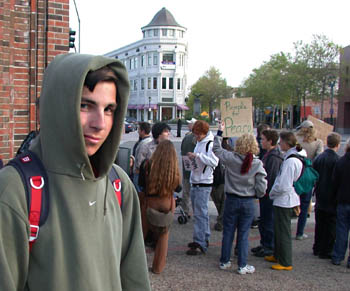
Photographs by Stephen Laufer
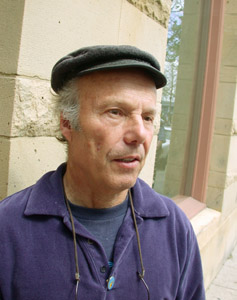
Carl Stancil, Humanitarian Veteran
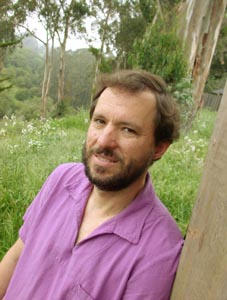
Stephen Zunes, Political Educator
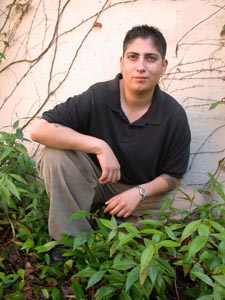
Maribel Gallardo, Gang Intervention/Caring Mentor
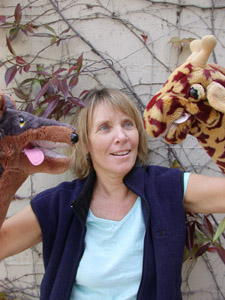
Jean Morrison, Peaceful Communicator
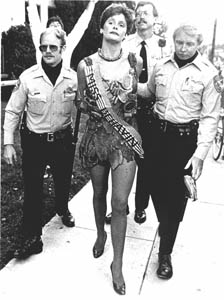
Ann Simonton, Renegade Model
From the March 26-April 2, 2003 issue of Metro Santa Cruz.